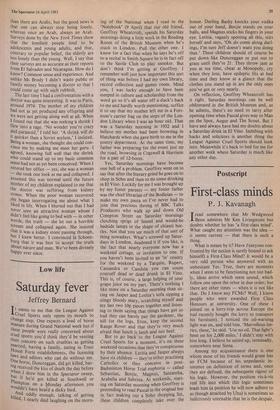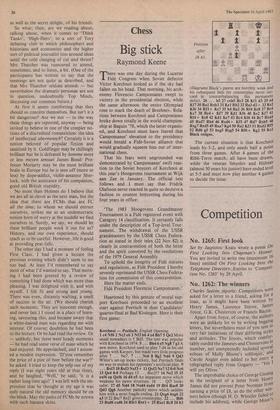Postscript
First-class minds
P. J. Kavanagh
Iread somewhere that Mr Wedgwood Berm admires Mr Ken Livingstone but doubts whether he has 'a first-class mind'. What caught my attention was the idea — it seems current — that there is such a thing.
What is meant by it? Have 1 (anyone con- fronted by the notion is surely bound to ask himself) a First-Class Mind? It would be a very odd person who answered with an unhesitant Yes. True, there are moments when I seem to be functioning not too bad- ly, ideas arrive which seem sound, which follow one upon the other in due order; but there are other times — when it is not like that. Do I know any FCMs? Well, I know people who were awarded First Class Honours at university. One of these I joined on a lorry-trip across Europe (he had recently bought the lorry to transport his furniture). I noticed the oil-warning light was on, and told him. 'Marvellous lor- ries, these,' he said. 'Use no oil. That light's been on for 2,000 miles.' I didn't stay with him long. I believe he seized up, terminally, somewhere near Siena.
Among my acquaintance there is one whom most of his friends would grant has an FCM because of his unpedantic in- sistence on definition of terms and, once they are defined, the subsequent rigour of his logic. However, the position vis-à-vis real life into which this logic sometimes leads him (a position he will now adhere to as though attached by Uhu) is sometimes so ludicrously untenable that he is the despair, as well as the secret delight, of his friends.
So what, then, are we reading about, talking about, when it comes to 'Think Tanks', 'High-fliers'; to a sort of Tory debating club in which philosophers and historians and economists and the higher sort of political journalist toss around ideas amid the cold clanging of cut and thrust? Mrs Thatcher was rumoured to attend, sometimes, and to listen, a bit. (One of the participants has written to say that the meetings are not quite as described, and that Mrs Thatcher seldom attends — but nevertheless the dramatis personae are not in question, undoubtedly Top Minds, discussing our common future.)
At first it seems comforting that they should so concern themselves. But isn't it a bit dangerous? Are we not — in the way these things are reported, anyway — being invited to believe in one of the creepier no- tions of a discredited romanticism: the idea of intellectual ubermensch? Certainly it is a notion beloved of popular fiction and sanitised by it. Goldfinger may be chillingly brilliant but he is defeated by homme more or less tnoyen sensuel James Bond: Pro- fessor Moriarty may be the most brilliant brain in Europe but he is seen off (more or less) by dope-addict, violin-amateur Sher- lock, with the assistance of his companion, good old British stupidity.
No more than Holmes do I believe that we are all as clever as the next man, but the idea that there are FCMs that are FC all the time, to whom we should entrust ourselves, strikes me as an undemocratic notion born of worry at the muddle we find ourselves in. Surely, we say, we should let these brilliant people work it out for us? History, and our own experience, should teach us to be careful. However, life is good at providing prat-falls.
The other day I had a moment of feeling First Class. I had given a lecture the previous evening which didn't seem to me too bad. At least I'd remembered to say most of what I'd wanted to say. That morn- ing I had been greeted by a review of something I had done which was more than pleasing. I was delighted with it, and with myself. I felt fit and strong and young. There was even, distantly wafting, a smell of success in the air. (We should cherish such moments. They are innocent enough, and never last.) I stood in a place of learn- ing, savouring this, and became aware that a white-haired man was regarding me with interest. Of course; doubtless he had been to the lecture. Or he had read the review. Or — unlikely, but these were heady moments — he had read some verse of mine which he had enjoyed. He approached, and I assum- ed a modest expression. 'D'you remember the price of a pint of beer before the war?' he asked. I tried to keep the yelp out of my reply (I was eight years old at that time), and he laughed, 'Well,' he said, 'it is a rather long time ago!' I was left with the im- pression that he thought at my age it was only natural the old memory should be on the blink. May the paths of FCMs be strewn with such banana skins.











































 Previous page
Previous page